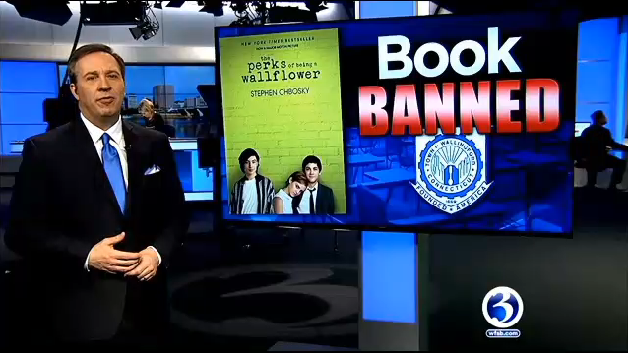UPDATE: Plenty has happened since NCAC’s letter. Get the latest details here.
Here we go again.
Stephen Chbosky’s popular–and frequently challenged– young adult novel The Perks of Being A Wallflower was removed from the freshman English curriculum by Wallingford Public Schools Superintendent Dr. Salvatore Menzo, who overturned a review committee’s decision to keep the book.
And here’s an interesting wrinkle: The parent who filed the complaint, Jean-Pierre Bolat, just so happens to be a member of the school board.
Though he had made his feelings about the book known months earlier, Bolat’s formal complaint about Perks was filed by on January 1. He was appointed to Wallingford school board a few weeks later.
According to an account in the Meridan Record-Journal, a “committee of teachers and library staff” reviewed Bolat’s complaint– which was apparently focused on the book’s sexual content– and decided to keep the book. As per district guidelines, Bolat appealed that decision to superintendent Menzo, who overruled the committee and decided to remove The Perks of Being A Wallflower from the curriculum.
Does Menzo’s move square with legal precedent–or the district’s own guidelines?
NCAC says it does not. Our March 20 letter–co-signed by the American Booksellers for Free Expression, the Comic Book Legal Defense Fund, PEN American Center, the Association of American Publishers and the National Council of Teachers of English– points out that
the relevant law prevents school administrators from granting one parent control over the education of other children, or from privileging the moral values of some parents over others…. In acceding to the parent’s demand, the district necessarily denies other students and parents equivalent rights. Moreover, the complaining parent has no enforceable right to have the book removed.
What’s more, the decision flies in the face of Wallingford’s own guidelines:
While the Board of Education upholds the right of all parents to assess and evaluate their own children’s educational materials, it will resist any attempt to censor materials used by others.
Requests for reconsideration of instructional materials shall be carefully investigated, but it must be recognized that the ultimate responsibility for selection of educational materials rests with school authorities.
NCAC points out that the superintendent’s removal of the book, absent an educational rationale “is both educationally and legally suspect.” But it is not necessarily the final word; district policy allows for an appeal to the school board following the superintendent’s decision.
NCAC and its partners are urging the board to take advantage of that provision and reverse the superintendent’s decision.


